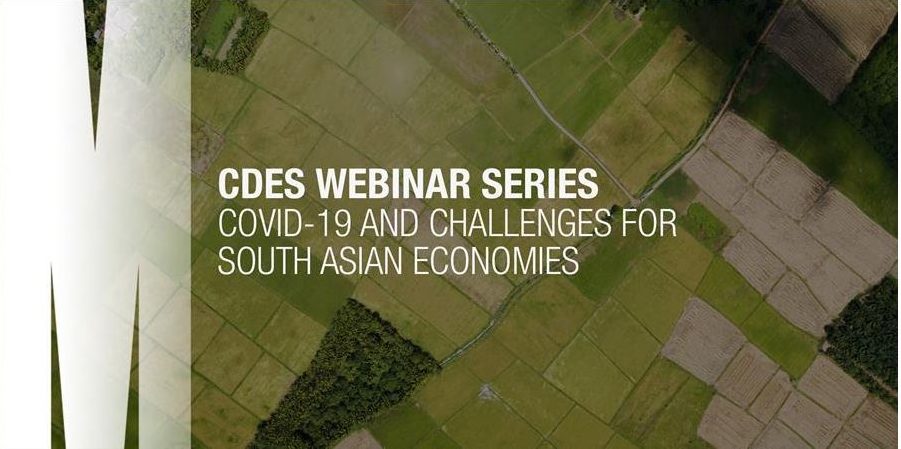
Reading Time: 2 min read
Stringent regulations in place to contain the spread of the Coronavirus (COVID-19) restricted economic activity, halted trade, and triggered loss of jobs around the world. South Asia being the most populous region in the world remains vulnerable to COVID-19 due to limited access to healthcare and social safety nets. The World Bank has warned that the unprecedented crisis posed by the Coronavirus (COVID-19) pandemic may lead South Asia to its worst economic performance in 40 years with low-income workers in the hospitality sector, retail trade and transport sectors facing the brunt of the economic fallout.
Speaking at the webinar titled “COVID-19 and Challenges for South Asian Economies” hosted by the Monash University, the Executive Director of LKI, Dr Ganeshan Wignaraja outlined the decisive measures Sri Lanka implemented to manage the public health emergency, the impact of the crisis on the economy, and opportunities in capturing shifting FDI.
Delivering his opening remarks, Dr. Wignaraja said Sri Lanka had tackled the public health emergency relatively well compared to other regional states. He noted that efficient contact tracing, higher levels of immunity and nutrition in the population, and the island’s robust healthcare system had largely helped to contain the spread of the virus and avoid a community spread.
Dr Wignaraja said the impact of the economic fallout of the pandemic was visible in Lanka’s exports, FDI, and capital outflows during the first quarter of 2020. In terms of the Sri Lanka’s post-COVID-19 economy, he said “we have a debt overhang and we have twin deficits on the fiscal sides and also on balance of payments and that has constrained our ability to act,” noting that the pressure the crisis has imposed on the banking system and the declining demand from export markets could dampen Sri Lanka’s outlook.
Speaking on optimistic trends, he said the growing demand for tea, agri-food, and Personal Protective Equipment (PPE) can add momentum to economic activity as Sri Lanka gradually returns to normalcy. Commenting on trends that can become opportunities for Sri Lanka and the South Asian region, Dr Wignaraja said FDI is moving from China to other regions and the recent crackdown in Hong Kong may even trigger financial services to move out. “Hambantota port in Southern Sri Lanka and the industrial zone could receive some of the manufacturing FDI as it moves out of China. And the Colombo Port City could eventually be a modern services hub,” he said.
The webinar was jointly hosted by the Centre for Development Economics and Sustainability (CDES) of Monash University, The Asia Foundation Bangladesh, Institute for Integrated Development Studies (IIDS), Institute for Policy Studies of Sri Lanka (IPS), Pakistan Institute of Development Economics (PIDE), and the Lakshman Kadirgamar Institute of International Relations and Strategic Studies (LKI).
Dr. Wignaraja was joined by Dr. Nadeem UL Haque, Vice Chancellor, PIDE; Dr. Swarnim Wagle, Chairman, IIDS; and Dr. Selim Jahan, Former Director, Human Development Report, UNDP. The panel discussion was moderated by Sisira Jayasuriya, CDES.
Please access this link for a video recording of the full panel discussion:
https://www.youtube.com/watch?v=hEES7YeI_Zc&feature=youtu.be



